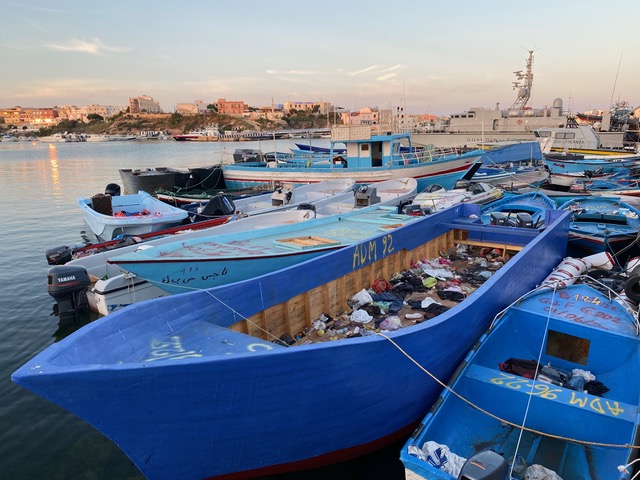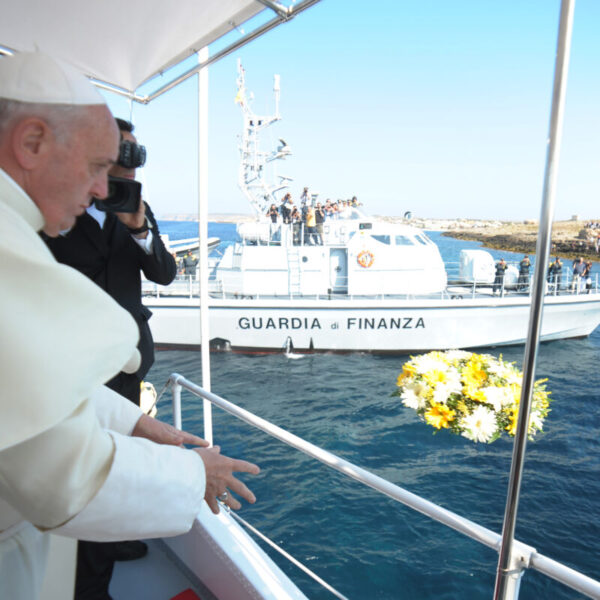At the time when the conclave opens to designate his successor, the memory of Pope Francis and his commitment to the excluded remains vivid. His first trip, to Lampedusa in 2013, announced a clear priority: to give voice to the forgotten, to denounce the indifference towards the migratory dramas, and to embody a Church close to the harshest human realities. A choice that remained intact until his passing.
On July 8, 2013, just four months after his election, Francis traveled to Lampedusa for his first outing outside the Diocese of Rome. This choice, far from being trivial, surprised and left a mark. For this small Italian island, a little over 100 km from the Tunisian coast, has been a major arrival point for migrants from Africa for years, often at the cost of their lives.
Interviewed a few days before this visit, the island's priest, still incredulous, told the media that Lampedusa would become, for one day, "the heart of the world." Far from the triumphant travels of his predecessors, the pope wanted a simple, almost confidential approach. The Vatican spoke of a "sober and discreet" visit, motivated by the pain caused by a recent shipwreck of migrants in the Mediterranean.
A Punchy Homily
But the impact of this trip was anything but discreet. On the island's sports field, Francis delivered a homily of rare intensity. He denounced "the globalization of indifference" and pointed to a collective responsibility in the tragedy of deaths at sea. The migrants, he denounced, "were seeking to escape difficult situations to find a bit of serenity and peace; they found death."
This speech resonated as a break from a certain diplomatic restraint, more customary of Vatican practices. It was the tone of an engaged, indignant pastor who chose not to look away.
This first trip announced what would be the entire trajectory of Pope Francis: a constant attention to the "peripheries," in his own words. Even before his election, Cardinal Bergoglio had urged the Church to "go out of itself" and to reach out to "the existential peripheries," where pain, injustice, and solitude are expressed.
He put this vision into practice, traveling to areas rarely visited by his predecessors: Madagascar, East Timor, the Democratic Republic of the Congo, Cuba, Bangladesh... All distant destinations from centers of power, chosen to embody a Church close to the people.
A Mediterranean on Permanent Alert
The Mediterranean occupies a unique place in this papacy. Francis has visited many countries along its shores: Greece, Cyprus, Malta, Albania, Egypt, Palestine, Turkey, Israel... Not for geopolitical reasons, but to remind that this sea, cradle of civilizations, has become a cemetery and a mirror of global fractures.
Francis has never relaxed his attention to migration issues. In his encyclicals and messages, he made it a recurring theme. During the 105th World Day of Migrants and Refugees, he summarized his approach in four verbs: welcome, protect, promote, integrate. In Christus Vivit, an exhortation addressed to young people, he even went so far as to describe migrants as "the paradigm of our time."
The pope did not hesitate to challenge political leaders. In February 2025, a few months before his passing, a letter addressed to American bishops denounced a mass deportation program. He wrote that "a properly formed conscience cannot fail to express its disagreement with any measure that tacitly or explicitly identifies the illegal status of certain migrants with criminality."
Through such positions, he attracted hostility from some political leaders but maintained a consistent line: that of a lived Gospel without compromise.
A Personal Memory of Exile
This fight was not abstract for Francis. Himself a descendant of Italians who emigrated to Argentina in the early 20th century, he carried within him the family memory of exile and the hope for a better life. He also liked to remind that the Holy Family had to flee to Egypt to escape the violence of King Herod: a flight that made them, he said, "a family of migrants."
This deep connection with migrants traversed his entire papacy, up to his last days. During the funeral mass, Cardinal Giovanni Battista Re reminded that his first trip was to Lampedusa, "an island symbol of the drama of emigration." And at the Basilica of Santa Maria Maggiore, among those who came to say goodbye, refugees were present.

Cover Photo: Pope Francis during his trip to Lampedusa in 2013 © Vatican Media
